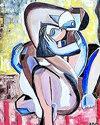Lispector ' s灵气
IF 0.3
4区 社会学
0 HUMANITIES, MULTIDISCIPLINARY
ANGELAKI-JOURNAL OF THE THEORETICAL HUMANITIES
Pub Date : 2023-03-04
DOI:10.1080/0969725X.2023.2192060
引用次数: 0
摘要
在她的最后一部中篇小说《星星的时刻》中,利斯佩克托清楚地表明,生命——任何生命——的光辉在于它无休止地思考自己的能力,因此它与思考的方式是分不开的。正如我们将在这篇文章中提出的,利斯佩克特的生命观是活生生的沉思,与乔治·阿甘本的“存在即潜能”的概念产生了共鸣。在他的《神圣人》系列的最后一部《身体的使用》中,阿甘本试图为西方生命政治提供另一种生命范式,西方生命政治的力量在于将赤裸的生命与生命形式分离开来。这个新本体论的核心是阿甘本关于生命与其模式或形式不可分割的概念,正如他用连字符强调的那样:生命形式。阿甘本所说的生命形式,是指一个人的生命永远不能简化为存在的生物或经济事实,因为它本质上关注的是它的潜力,它的存在的单一模式。沉思自己的生活是一种简单的生活,而不是简化为它的功能。在《星光时刻》中,利斯佩克特的女主人公玛卡姆萨并不像一些评论家认为的那样,仅仅是一个赤裸裸的人物,因为她的生活被简化为真实的环境。相反,她的生活受到自己对存在的感觉——未出生的可能性——的影响。本文章由计算机程序翻译,如有差异,请以英文原文为准。
Lispector’s Halo
Abstract In her last novella, The Hour of the Star, Lispector makes plain that the brilliance of life – any life whatever – lies in its capacity to endlessly contemplate itself and that as such it is inseparable from its mode of contemplation. As we will suggest in this article, Lispector’s view of life as living contemplation resonates with Giorgio Agamben’s conception of being as potentiality. In the last installment of his Homo Sacer series, The Use of Bodies, Agamben tries to offer an alternative paradigm of life to that of Western biopolitics, whose power operates on its separation of bare life from forms of life. Central to this new ontology is Agamben’s notion of a life as inseparable from its mode or form, as he highlights using a hyphen: form-of-life. By form-of-life, Agamben means that one’s living is never reducible to the biological or economic facts of existence because it essentially concerns itself with its potentialities, its singular modes of being. Life that contemplates itself is a life which simply is without being reducible to its function. In The Hour of the Star, Lispector’s heroine, Macabéa is not simply a figure of bare life as some critics have suggested by reducing her life to her factual circumstances. She is rather a figure whose life is affected by its own sensation of existing – its unborn possibilities.
求助全文
通过发布文献求助,成功后即可免费获取论文全文。
去求助
来源期刊

ANGELAKI-JOURNAL OF THE THEORETICAL HUMANITIES
HUMANITIES, MULTIDISCIPLINARY-
CiteScore
0.60
自引率
33.30%
发文量
57
期刊介绍:
Angelaki: journal of the theoretical humanities was established in September 1993 to provide an international forum for vanguard work in the theoretical humanities. In itself a contentious category, "theoretical humanities" represents the productive nexus of work in the disciplinary fields of literary criticism and theory, philosophy, and cultural studies. The journal is dedicated to the refreshing of intellectual coordinates, and to the challenging and vivifying process of re-thinking. Angelaki: journal of the theoretical humanities encourages a critical engagement with theory in terms of disciplinary development and intellectual and political usefulness, the inquiry into and articulation of culture.
 求助内容:
求助内容: 应助结果提醒方式:
应助结果提醒方式:


